
How Should We Think?
What Are the Things That Are Not Seen?
It should not surprise any of us to know that the Scriptures have very much to say about how we are to think. Our lives are directed by what goes on in our minds and hearts. Our thoughts control our actions — they trigger the muscles that direct what we do — and give us what is known as “consciousness” to think, devise, plan, accomplish, theorize, imagine, and do every other thing that us humans are able to accomplish. Everything we do begins with what goes on between our ears.
God’s Ability to Read Our Minds
This fact may seem trite and elementary, but in fact it is the very essence by which the Eternal interacts with all of us. We read in Hebrews 4:12:
“For the word of God is living and powerful, and sharper than any two-edged sword, piercing even to the division of soul and spirit, and of joints and marrow, and is a discerner of the thoughts [enthumesis, ‘deliberate, be inspired, ponder’] and intents [ennoia, ‘thoughtful, moral understanding’] of the heart.”
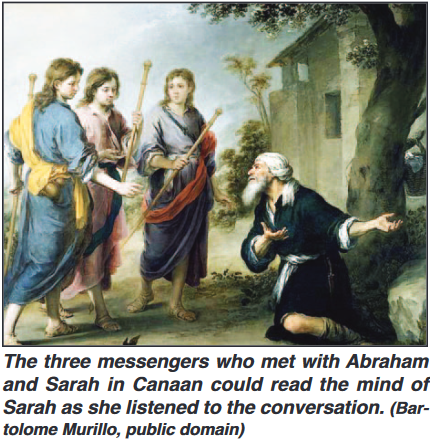 Here God is making clear that He discerns the very inner thoughts of people, even as Jesus could know [eido, “to see”] the thoughts of His adversaries, especially the Pharisees (Matthew 9:4; 12:25; Luke 6:8; 9:47; 11:17). Recall that when the messenger (likely Christ Himself) spoke to Abraham in Canaan saying that Sarah would have a son in her old age, Sarah, who overheard the discussion, laughed within herself and said, “After I have grown old, shall I have pleasure, my lord being old also?” (Genesis 18:12). The Messenger said to Abraham, “Why did Sarah laugh,saying, ‘Shall I surely bear a child, since I am old’” (verse 13)? We see that God has the ability to read the minds of people, discerning their thoughts and intents.
Here God is making clear that He discerns the very inner thoughts of people, even as Jesus could know [eido, “to see”] the thoughts of His adversaries, especially the Pharisees (Matthew 9:4; 12:25; Luke 6:8; 9:47; 11:17). Recall that when the messenger (likely Christ Himself) spoke to Abraham in Canaan saying that Sarah would have a son in her old age, Sarah, who overheard the discussion, laughed within herself and said, “After I have grown old, shall I have pleasure, my lord being old also?” (Genesis 18:12). The Messenger said to Abraham, “Why did Sarah laugh,saying, ‘Shall I surely bear a child, since I am old’” (verse 13)? We see that God has the ability to read the minds of people, discerning their thoughts and intents.
Everything is naked and exposed before God’s eyes (Hebrews 4:13), He sees every heart and knows every plan and thought (I Chronicles 28:9), He examines every thought of man (Psalm 94:11), He knows everything (I John 3:20), He knows the heart (Acts 15:8), and He knows our thoughts even before they enter our minds (Psalm 139:2)!
Even the Devil seeks out vulnerable people whom he might subjugate and imprison within his web of lies and deceit. As we know well, he prowls over the earth like a roaring lion, “… seeking whom he may devour” (I Peter 5:1). Yet, even though he is the god of this world (II Corinthians 4:4; Matthew 4:8-9), he operates through influencing people to follow evil, unlawful courses of behavior through infecting all of society with his character: drunkenness, sexual immorality, thievery, idolatry, self-aggrandizement … and the list goes on and on (Galatians 5:19-21). We call these qualities “works of the flesh.” These works directly conflict with the fruits of God’s spirit, and might be said to be a sort of “frequency” of evil that pervades the whole world (Revelation 12:9). Satan observes people in order to view their weaknesses, and tempts them to commit lawless acts, just as he did with Adam and Eve in the Garden of Eden (Genesis 3:1-7), with the King of Israel as Micaiah foresaw (I Kings 22:19-23), and with the boils cast upon Job and the loss of his family and livestock (Job 1 and 2). There is no indication that Satan actually read the minds of the people he influenced, but he certainly could view their tendencies and weaknesses so he could lay traps around them. As James wrote:
“Let no one say when he is tempted, ‘I am tempted by God’; for God cannot be tempted by evil, nor does He Himself tempt anyone. But each one is tempted when he is drawn away by his own desires and enticed. Then, when desire has conceived, it gives birth to sin; and sin, when it is full-grown, brings forth death” (James 1:13-15).
This is not to say that evil spirits cannot inhabit people who have turned their will over to them. For instance, Mary Magdalene was relieved of seven devils by Jesus (Mark 16:9), and the disciples cast out devils from many (Matthew 10:8; Luke 13:32). Unclean spirits, when cast out of a person, seek to reinhabit the same person or other people if they find an opening (Matthew 12:43-45), but there are no clear indications that they can actually read the thoughts of people, as can Jesus Christ and the Father.
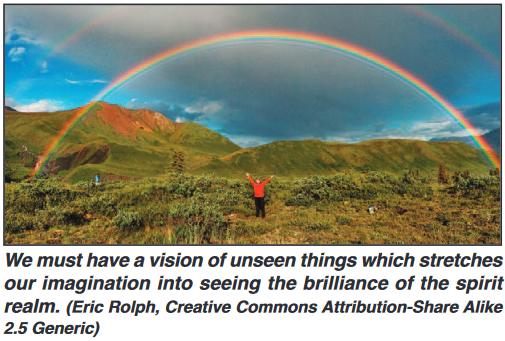 These facts point towards the reality that we must strive with every fiber of our being to have pure thoughts centered upon the Creator. Note these straightforward words from Scripture:
These facts point towards the reality that we must strive with every fiber of our being to have pure thoughts centered upon the Creator. Note these straightforward words from Scripture:
“Search me, O God, and know my heart; try me, and know my anxieties; and see if there is any wicked way in me, and lead me in the way everlasting” (Psalm 139:23).
“For the weapons of our warfare are not carnal but mighty in God for pulling down strongholds, casting down arguments and every high thing that exalts itself against the knowledge of God, bringing every thought into captivity to the obedience of Christ” (II Corinthians 10:5).
We Must Have a Vision of Eternal Things!
When speaking of thinking, we are led directly to the concept of vision. We must have a pictorial or conceptual view in mind of what is right and good, as stated in Proverbs 29:18:
“When there is no revelation [chazown, “prophetic vision”], the people cast off restraint; but happy is he who keeps the law.”
Not only that, but this vision must be directed towards eternal things. Our thoughts ought to be upon things related to the spirit realm, and if the spirit realm, then things that are everlasting in nature. Notice the words of Paul in II Corinthians 4:16-18:
“Therefore we ought not lose heart. Even though our outward man is perishing, yet the inward man is being renewed day by day. For our light affliction, which is but for a moment, is working for us a far more exceeding and eternal weight of glory, while we do not look at the things which are seen, but at the things which are not seen For the things which are seen are temporary, but the things which are not seen are eternal.”
Our vision must be towards eternal matters. That is our calling, that is our destiny. This fact leaves us with the next question: What are these things we must look at that are not seen? The “faith chapter” — Hebrews 11 — gives us remarkable insight into just what invisible things we must be envisioning continually. Let us examine just what the patriarchs viewed from “afar off” … what they saw from their perspective as physical beings while peering into the invisible spirit realm.
(1) A city which has foundations
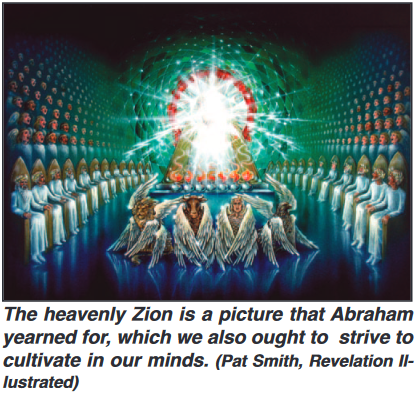 “By faith he [Abraham] dwelt in the land of promise as in a foreign country, dwelling in tents with Isaac and Jacob, the heirs with him of the same promise; for he waited for the city which has foundations, whose builder and maker is God” (Hebrews 11:9-10).
“By faith he [Abraham] dwelt in the land of promise as in a foreign country, dwelling in tents with Isaac and Jacob, the heirs with him of the same promise; for he waited for the city which has foundations, whose builder and maker is God” (Hebrews 11:9-10).
This city that Abraham yearned for is the city of God, the heavely Zion, which John described in some detail in Revelation 4:1-8, and Ezekiel wrote about in Ezekiel 1:22-28 and 10:1. This is the very dwelling place of the Father, with Jesus Christ at His right hand, that the saints are prophesied to inherit after the resurrection (Revelation 3:21) as their “headquarters,” as it were. Their actual responsibility, however, will be to administer the Edenic Kingdom on the earth as stated in Revelation 5:10 and 20:4. This is the city that we seek, the one we believe is soon to come (Hebrews 13:14).
(2) A homeland
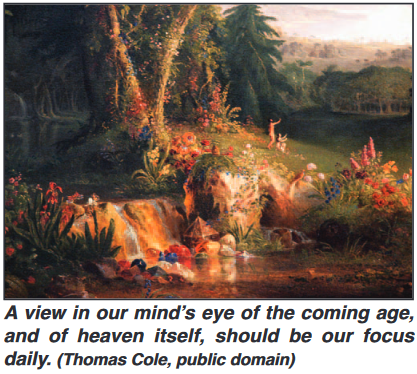 “These all died in faith, not having received the promises, but having seen them afar off were assured of them, embraced them and confessed that they were strangers and pilgrims on the earth. For those who say such things declare plainly that they seek a homeland” (Hebrews 11:13-14).
“These all died in faith, not having received the promises, but having seen them afar off were assured of them, embraced them and confessed that they were strangers and pilgrims on the earth. For those who say such things declare plainly that they seek a homeland” (Hebrews 11:13-14).
Like Jesus Christ, we have no permanent place in this society, wherein Satan is the “god of this world [aion, “age”] (II Corinthians 4:4). He bluntly stated, “My kingdom [basileia, “rule, realm”] is not of this world [kosmos, “orderly arrangement, society around us”] (John 18:36). He figuratively alluded to this in Matthew 8:20 — also in Luke 9:58 — when He said:
“Foxes have holes and birds of the air have nests, but the Son of Man has nowhere to lay His head.”
Notice the clear indiction as stated by Paul that we are not citizens of this world which surrounds us; we live in the world but are not of it (John 17:14):
“For our citizenship [politeuma, ‘community’] is in heaven, from which we also eagerly wait for the Savior, the Lord Jesus Christ …” (Philippians 3:20).
(3) The reward that Moses saw
“By faith Moses, when he became of age, refused to be called the son of Pharaoh’s daughter, choosing rather to suffer affliction with the people of God than to enjoy the passing pleasures of sin, esteeming the reproach of Christ greater riches than the treasures of Egypt; for he looked to the reward” (Hebrews 11:24-26).
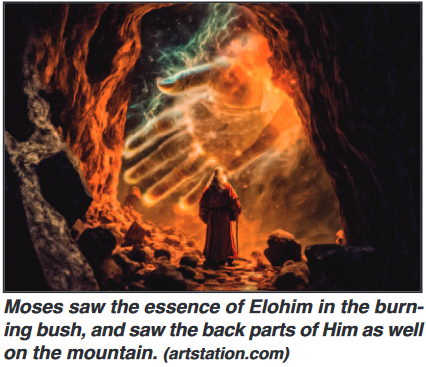 These verses indicate that Moses must have been taught the truths of God even when being “brought up by Pharaoh’s daughter” — for he was nursed and kept by his genuine mother until at least into his teenage years. During that time his father and mother, Amram and Jochebed (Exodus 6:20), would have taught him the understandings of God’s eternal laws, setting a bedrock foundation of knowledge concerning the reality of Christ as revealed in the writings and traditions preserved through the centuries. After all, it was Moses who wrote the Pentateuch, so he had to have access to God’s truths throughout his life. See the story in Exodus 2:1-10. The reward that Moses saw was, of course, the resurrection and eternal life with the Father and Christ, which has been taught throughout Israel’s history.
These verses indicate that Moses must have been taught the truths of God even when being “brought up by Pharaoh’s daughter” — for he was nursed and kept by his genuine mother until at least into his teenage years. During that time his father and mother, Amram and Jochebed (Exodus 6:20), would have taught him the understandings of God’s eternal laws, setting a bedrock foundation of knowledge concerning the reality of Christ as revealed in the writings and traditions preserved through the centuries. After all, it was Moses who wrote the Pentateuch, so he had to have access to God’s truths throughout his life. See the story in Exodus 2:1-10. The reward that Moses saw was, of course, the resurrection and eternal life with the Father and Christ, which has been taught throughout Israel’s history.
(4) A vision of God Himself
“By faith he [Moses] forsook Egypt, not fearing the wrath of the king; for he endured as seeing Him who is invisible” (Hebrews 11:27). Moses strove to literally see, in his mind’s eye, the very personage of the Father and Jesus Christ, not only their physical or spiritual form but even more so their character (see point 9). If one has seen Christ he has seen the Father (John 14:9). In the burning bush Moses saw the miraculous nature of fire in a bush, while the bush was not consumed … but out of which the Eternal spoke to him (Exodus 3 and 4). He saw up close the “back parts of God” (Exodus 33:18-23), and conversed with God countless times. This enabled Moses to have an intimate vision of the Eternal’s glorious appearance and character, a bit of which is revealed in Revelation 1:10-16.
(5) The resurrection
“Women received their dead raised to life again. Others were tortured, not accepting deliverance, that they might obtain a better resurrection” (Hebrews 11:35).
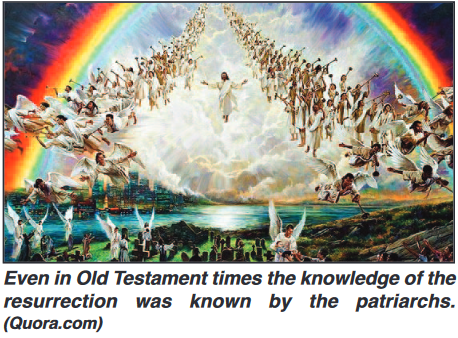 The fact that these patriarchs are said to have desired a better resurrection proves that the Scriptures which the patriarchs had at the time of Abraham, Moses, Joseph, Sampson, and others, revealed the reality of that raising to eternal life. We know it was God’s plan to redeeem mankind from the consequences of sin — which is death — ever since Adam and Eve sinned in the Garden of Eden. While we do not know exactly when the knowledge of the resurrection first was understood, it is possible that knowledge was given even before the Flood.
The fact that these patriarchs are said to have desired a better resurrection proves that the Scriptures which the patriarchs had at the time of Abraham, Moses, Joseph, Sampson, and others, revealed the reality of that raising to eternal life. We know it was God’s plan to redeeem mankind from the consequences of sin — which is death — ever since Adam and Eve sinned in the Garden of Eden. While we do not know exactly when the knowledge of the resurrection first was understood, it is possible that knowledge was given even before the Flood.
In any case, we have examples of people being returned to life after death in I Kings 17:17-24 (Elijah raising the widow’s son), and II Kings 4:18-20, 32-37 (Elisha raising the Shunammite’s son). Psalm 16:8-11, 49:13-15, and 71:20 refer to a resurrection, as do Isaiah 26:19-20 and 53:10-11. Ezekiel 37:7-10, Daniel 12:2-3, Hosea 6:1-2, and Jonah 1:17-2:2, 6-7, 10 also refer to the resurrection. Especially illustrative of this truth is Job 14:14-15:
“If a man dies, shall he live again? All the days of my hard service I will wait, till my change comes. You shall call, and I will answer You; you shall desire the work of Your hands.” (See also Job 19:25-26).
(6) Being made perfect alongside, Abraham, Moses, Elijah, and other patriarchs
“And all these, having obtained a good testimony through faith, did not received the promise, God having provided something better for us, that they should not be made perfect apart from us” (Hebrews 11:39-40).
The patriarchs knew of the resurrection as covered in point (5), and likely understood that all of the elect would be raised together at Christ’s return, at the Last Trumpet. They would have understood very well Paul’s words to the Thessalonians:
“But I do not want you to be ignorant, concerning those who have fallen asleep, lest you sorrow as others who have no hope. For if we believe that Jesus died and rose again, even so God will bring with Him those who sleep in Jesus. For this we say to you by the word of the Lord, that we who are alive and remain until the coming of the Lord will by no means precede those who are asleep …. Then we who are alive and remain shall be caught up together with them in the clouds to meet the Lord in the air. And thus shall we always be with the Lord” (I Thessalonians 4:13-15, 17).
(7) The essence of faith [pistis, “conviction of the truth, especially respecting one’s relationship to God and divine beings, along with the idea of trust and holy fervor born of faith, and joined with it”; from peitho, “to convince by argument”].
“Now faith is the substance [hupostasis, ‘a support under, essence, assurance’] of things hoped for, the evidence [elogchos, ‘proof, conviction’] of things [pragma, ‘a deed, affair, or object’] not seen [blepo, ‘to look at’]” (Hebrews 11:1).
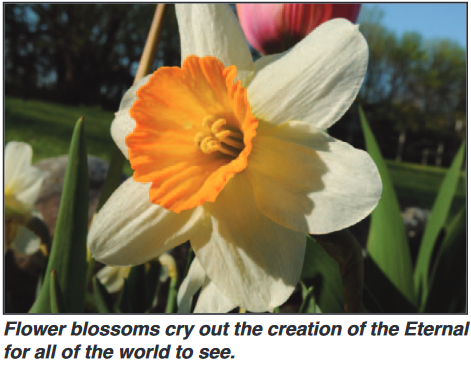 The “evidence of things not seen” is all around us in the creation, as point (8) tells us. Recall what Jesus told His disciples: “Thomas, because you have seen Me, you have believed. Blessed are those who have not seen and yet have believed” (John 20:29).
The “evidence of things not seen” is all around us in the creation, as point (8) tells us. Recall what Jesus told His disciples: “Thomas, because you have seen Me, you have believed. Blessed are those who have not seen and yet have believed” (John 20:29).
(8) The creation itself, carried out by God’s word
“By faith we understand that the worlds were framed by the word of God, so that the things which are seen were not made of things which are visible” (Hebrews 11:3).
“For since the creation of the world His invisible attributes are clearly seen, being understood by the things that are made, even His eternal power and Godhead, so that they are without excuse” (Romans 1:20).
The creation of the eternal Father and Jesus Christ, visible in the living forms surrounding us — plants, flowers, animals, birds, fish, microorganisms, etc. — as well as in the minerals of the earth, its water, the atmosphere, and the cycles of renewal, reveals the very nature of God in the heavenly realm. The spiritual environment of heaven is revealed by the things we see here on earth. These living and non-living components of the physical earth show us the Eternal’s spirit world, the reality that we will view in its spectacular beauty once we are raised to eternal life! Encapsulated within these created things are the very qualities of God’s character and His love.
(9) Qualities of God’s spirit
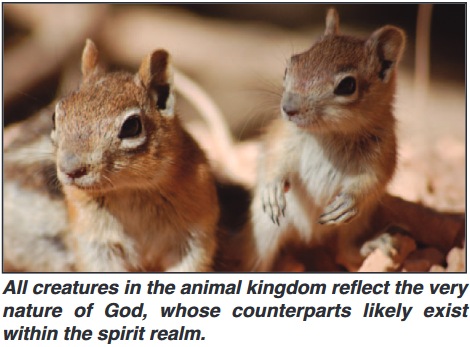 We are to practice the character of our heavenly Father and Jesus Christ continually, for the spirit placed within us codifies for these ways. These traits are not visible in the physical world, but are eternal traits that we must “look at” to do.
We are to practice the character of our heavenly Father and Jesus Christ continually, for the spirit placed within us codifies for these ways. These traits are not visible in the physical world, but are eternal traits that we must “look at” to do.
“But the fruit of the spirit is love, joy, peace, longsuffering, kindness, goodness, faithfulness, gentleness, self-control. Against such there is no law” (Galatians 5:22-23).
“Finally, brethren, whatever things are true, whatever things are noble, whatever things are pure, whatever things are lovely, whatever things are of good report; if there is any virtue and if there is anything praiseworthy — meditate on these things” (Philippians 4:8).
“He has shown you, O man, what is good; and what does the Lord require of you but to do justly, to love mercy, and to walk humbly with your God?” (Micah 6:8).
“And now, Israel, what does the Lord your God require of you, but to fear the Lord your God, to walk in all His ways and to love Him, to serve the Lord your God with all your heart and with all your soul” (Deuteronomy 10:12).
“Love suffers long and is kind; love does not envy; love does not parade itself, is not puffed up; does not behave rudely, does not seek its own, is not provoked, thinks no evil; does not rejoice in iniquity, but rejoices in the truth; bears all things, believes all things, hopes all things, endures all things” (I Corinthians 13:4-7).
While the fruits of the spirit are not seen physically, they are very real through our behavior as the sons of God.
Focusing On Things Not Seen
It is crucial during our spiritual walk here on earth — which Paul describes as being “but for a moment” (II Corinthians 4:17) — that we strive to concentrate on the things which are not seen. This effort is not an easy one, for “The heart is deceitful above all things, and desperately wicked … “ (Jeremiah 17:9) … that is, the human heart apart from God. Likewise, as Paul wrote to the Romans:
“Because the carnal mind is enmity against God; for it is not subject to the law of God, nor indeed can be” (Romans 8:7).
carnal = sarx, “flesh, the meat of a being as opposed to the soul or spirit”
enmity = echtha, “hostility, discord, a reason for opposition.”
We must battle the human spirit and its tendency towards degeneration by putting on the whole armor of God, for we wrestle against the Satanic forces of principalities, rulers of the darkness of this age, and spiritual hosts of wickedness in heavenly places (Ephesians 6:12). To be victors in this battle we must focus our attention on the things that have been discussed:
* Our future residence in the heavenly Zion
* Our coming homeland in the next age, the renewed Eden on earth and the reality of heaven itself
* The resurrection and our part in it
* An eternal existence alongside the patriarchs and our fellow brothers and sisters in Christ
* Faith in our heavenly Father’s promises, that He will accomplish every prophecy He has given us
* The incredible beauty and instruction of the created world — the trees, flowers, animals, birds, fish, etc. — in revealing God’s reality
* Exercising the fruits of the spirit continually
Let us emphasize especially the sixth point above in our everyday lives, not in any way minimizing the importance of the others. We ought to make every effort to surround ourselves with the created world. We can escape the city, its concrete and steel, noise and pollution, and shape our thoughts around the green trees and plants, the blue and cloud-dotted sky, the fragrances and colors of flowers, the soothing sounds of wind in the trees and the rushing of water of a stream, the chiming of insects and the singing of birds. These creations inspire us to think of heavenly things and pull us out of the depressive state of the present age and its god, Satan the Devil. As a prayer of Moses states in Psalm 9:16-17:
“Let Your work appear to Your servants, and Your glory to their children. And let the beauty of the Lord our God be upon us, and establish the work of our hands for us; Yes, establish the work of our hands”
Let us be like King David, who so greatly desired to …”dwell in the house of the Lord all the days of my life, to behold the beauty of the Lord, and to inquire in His temple” (Psalm 27:4). We likewise must look not at the things that are seen, but at the spiritual things in our mind’s eye which are not seen. Then the days of our light affliction, which are but for a moment, will indeed work for a far greater weight of eternal glory than this current ephemeral world has to offer!

